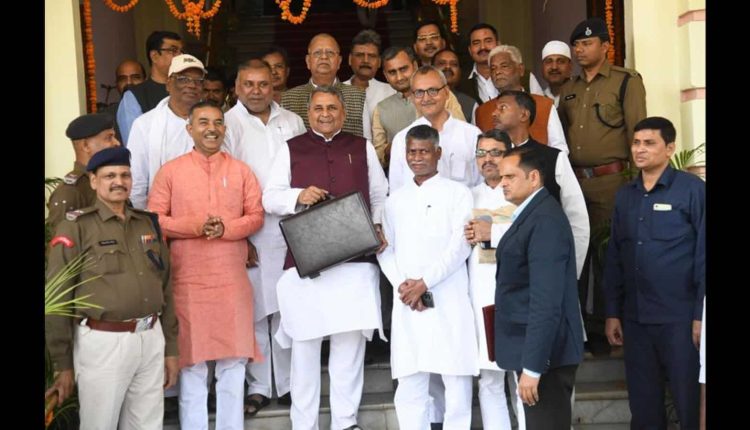The Nitish Kumar government in Bihar Tuesday presented the state budget for fiscal 2023-24 with a total outlay of about ₹2.62 lakh crore, an increase of about ₹24,000 crore from the current fiscal’s budget, with focus on youth and employment, education, health and infrastructure, but steered clear of announcing any major new schemes.
“We have increased the budget outlay for 2023-24 by over 10% compared to 2022-23. Our better fiscal management has helped us in capping the fiscal deficit within the permissible limits. We have estimated a revenue surplus budget,” finance minister Vijay Kumar Choudhary, who tabled the budget, said.
The fiscal deficit for 2023-24 has been pegged at 2.98% of the gross state domestic product( GSDP), which is within the permissible limit of 3% set under the Fiscal Responsibility Budget Management Act (FRBM).
The highest allocation is for education with a total outlay of ₹40,450 crore, followed by health ( ₹16,966 crore), road ( ₹17,487 crore) and social welfare sector ( ₹12,439 crore).
This is the first budget of Nitish Kumar’s new government formed after his party JD-U dumped the BJP in August last year and joined hands with RJD, Congress and other parties.
In his speech, the finance minister highlighted the government’s emphasis on job creation. “We are working for generating 10 lakh jobs for youths. It’s already in motion, with requisition of 63,900 posts sent to Bihar Public Service Commission (BPSC) and Bihar Staff Selection Commission. We are working to fill up 48,762 posts of teachers and there would be big vacancies in police and other sectors,” Choudhary said.
The government’s focus on creating new jobs is also reflected in the salary bills projected for the next fiscal. The budget provisions an expenditure of ₹1,61, 855 crore under establishment and committed expenditure component (salary, pension, interests, etc), a rise of ₹24,394 crore compared to the current fiscal estimates of ₹1,37,460 crore. Under annual schemes (for development works), however, ₹1 lakh crore has been allocated, the same as current fiscal.
This means the government’s salary bill is rising owing to new appointments, interest payments and other committed expenditure, officials said.
On borrowings, the state government has increased the limit to ₹49,326 crore for the coming fiscal as against this financial year’s borrowing limit of ₹40,756 crore.
Additional chief secretary (finance) S Siddharth told reporters this was no quantum jump in borrowing limit.
The state government estimates to earn ₹49,700 crore from its own taxes in the coming fiscal.
Special status demand
Finance minister Choudhary also raised the demand for special category status for Bihar to tide over its backwardness despite having clocked 10.98% of economic growth last fiscal. “We need special status for faster economic progress as Bihar is plagued with certain geographical challenges and natural calamities like floods,” he said.
Pointing to the opposition BJP, Choudhary underlined that central devolutions for the coming fiscal may have risen to ₹1.02 lakh crore from current fiscal year’s revised estimates of ₹95,509 crore, but the grants in aid expected from the Centre for the coming fiscal was estimated at ₹53,377.92 crore, which was “ ₹4,623.37 crore less” than projected estimates for the current fiscal.
“Central devolutions is state’s right. But Bihar is getting less in grants in aid,” the finance minister said, though he acknowledged how centre had implemented several state schemes.
Main schemes
While no new schemes were announced in the state budget, Choudhary said the state government was focusing on youth development, women empowerment and infrastructure development.
Among the major schemes initiated, the finance minister said state government had made provision of ₹2,374 crore for Mukhyamantri Gram Sampark Yojana in 2023-24, ₹800 crore for self-employment to provide financial assistance to beneficiaries under Mukyamantri ST/ST Udhami yojana and other schemes, as well as ₹100 crore for Mukyamantri Kanya Vivah Yojana and other schemes.
He said financial assistance for for empowerment of divorced women among Muslim minorities has been raised from ₹10,000 to ₹25,000.



